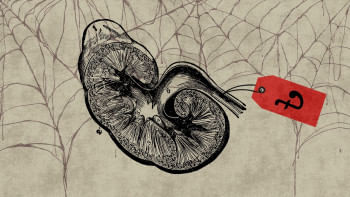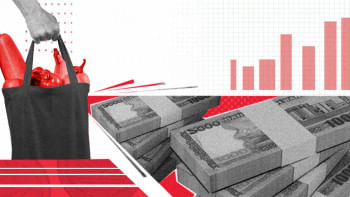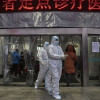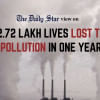Navigating development pathways in the evolving global order

The world, at present, is in an indeterminate state. Covid-19 reaffirmed that no event can be predicted with certainty, and that the entire continuum of any event occurring is possible. There could be known-knowns, known-unknowns, unknown-knowns and unknown-unknowns. Thus, any projected outcomes can be inconclusive, uncertain, chaotic or stochastic. Maximum likelihood estimation or thought experiment could end up like the proverbial Schrödinger's cat—dead and/or alive. A paradoxical trajectory is also a possibility.
The known-unknown quandary has become subtle, with geopolitics and geo-economics added into the development discourse. Thus, knowns and unknowns characterise the global order. The prevalent known-unknown quandary, however, could also create perplexing situations.
These provoke, and agitate us with, many questions. Some of them are: What are the transformational strategies to navigate complexities of the evolving global order? What could be the ways to overcome democratic deficit and governance failure? What are the appropriate approaches for economic diversification for achieving equitable and sustainable development? How will the developing world attain green transition amidst geopolitical tensions and energy politics by charting a path for a planetary resilience? How would such a task be financed?
The fundamental principles of a country's development policy originate from the aspirations of the people through their struggles. Hence, an aspirational development policy is an understanding of the type of society people want to live in. The transformation is deeply rooted in economy, society and polity. There are, therefore, unceasing contradictions and struggles between the two polar opposites: aspirations vis-à-vis impositions.
In recent years, both state and market have become more coercive and unaccountable. Markets have adopted predatory routes. Again, states have been more coercive, and violated their constitutions from which they derive their power. The fragile social contract, consequentially, alienates the state from its citizens. Societal norms and values, over the years, have made citizens conform to discrimination, precipitating clientelist networks to accumulate power.
The configuration of power determines allocation and distribution of public resources. A rentier political settlement dismantles institutions in the absence of accountability, and thus, vested interest is prioritised over citizens' welfare.
The well-being of people is contingent upon "public society." Public society emerges when power lies in the median population, similar to the normal distribution. In reality, though, there is a skewed distribution.
The Covid-19 pandemic exposed fault lines, triggered significant income erosion, and gnawed away at the standard of living due to the absence of social protection, while governments were at a loss, exacerbating the economic divide. The ongoing conflicts have exasperated the woes further. The gap between the income groups is widening.
Some countries are recovering relatively quicker than others owing to existing social coping mechanisms—universal social security, well-structured healthcare, fiscal capacity and technological advancement. Most LDCs are stagnating, even recoiling in their path towards achieving the SDGs and struggling to address the new poor and defenceless population. Hence, between and within countries, the recovery is taking the shape of a diverging K-curve due to the disproportionate policies and embedded structural differences in economic, social and geospatial vulnerabilities.
Many developing countries are yet to acknowledge healthcare, education and social security as people's rights. Many constitutions endorse these as fundamental principles, with no obligation on the state. There is silence about establishing healthcare, education and social security as citizens' rights.
A skewed political settlement breeds unequal economic opportunities. Often, policies, in effect, bail out the very system that causes the crisis in the first place. The rent-distributing government favours Wall Street over Main Street, rescuing financial institutions and patronising ruling elites using public money as opposed to provisioning equal rights to all. Ill-fated citizens, consequentially, suffer through losses of their jobs, savings, and homes.
Old orthodoxies are breaking down, necessitating a new paradigm of development and a new form of cooperation for a course correction from the reversal of the gains made in socio-economic progress in the last three decades. A new social contract amongst and within nations could lead to having a greener, safer and better future for the people and the planet.
The asymmetries—like Covid-19 and artificial intelligence—have stirred public debates in favour of fostering socio-economic, financial and technological resilience against future complex shocks and uncertainties. In order for a transformative change with inter-generational equity, policies require addressing compound risk multipliers such as climate change vulnerabilities, economic and financial shocks, ecological damages, technological uncertainties, and public health emergencies. The world is far away from convergence and entitlements of equality, human rights and social justice.
Bangladesh has travelled over 50 years as an independent state. From the infamous "basket case," the country has transformed into a curious case of "development surprise." Alongside the achievements, major challenges loom large.
Bangladesh is the eighth most populated country in the world, although it ranks 94th in terms of geographic size. Most of the land area is bordered by India and some parts by Myanmar, with China in close vicinity. It occupies a strategically significant position in the Bay of Bengal. It lies at the centre of South and Southeast Asia, and is a source of connecting China's southern landlocked region. The Bay is also a reservoir of huge natural resources. Bangladesh, having experience in engagements with actors in the region and beyond, is now passing a critical moment in its quest for prosperity.
The rise and fall of civilisations, based on scientific historiography, can be a pointer. The grain-based agriculture connected civilisations of Asia, joining civilisations of different geographies. Not only did the two different monsoons help in growing crops—the summer blowing from the southwest, and the winter from northeast—but also allowed for the shipping of goods.
Rice, the monsoon's product, linked Asia. Rice is the least allergenic of grains and produces significant calories per hectare, feeding densely populated societies. Nevertheless, institution and political settlement are key. For example, in Angkor, the hydraulic system broke down and the empire fell.
A recent systematic archaeobotanical evidence, from Wari-Bateshwar ruins in Bangladesh, found Japonica rice, indicating diffusion from the East. This indicates the two-way connectivity of the past. This could herald an optimistic future since the aspirations of the people of Bangladesh are immense.
This article is an abridged version of a presentation prepared for the First Development Studies International Conference, to be held on May 5-6, 2024 by the Department of Development Studies, University of Dhaka, and daily Bonik Barta.
Dr Rashed Al Mahmud Titumir is Professor and Chairman, Department of Development Studies, University of Dhaka.
Views expressed in this article are the authors' own.
Follow The Daily Star Opinion on Facebook for the latest opinions, commentaries and analyses by experts and professionals. To contribute your article or letter to The Daily Star Opinion, see our guidelines for submission.

 For all latest news, follow The Daily Star's Google News channel.
For all latest news, follow The Daily Star's Google News channel. 











Comments